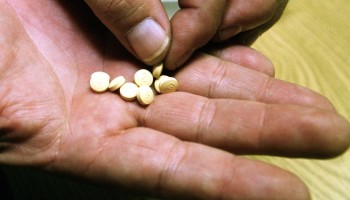Syria's anti-narcotics unit seized 100,000 Captagon pills at the border with Jordan on Tuesday, while a day earlier, Saudi customs authorities intercepted nearly 1.4 million tablets hidden in a shipment of air conditioning units, authorities in those countries reported.
Captagon is the most widely used drug in the Middle East, and Syria is believed to be the world’s leading producer.
Syria’s Interior Ministry provided no details about the seizure, stating only that "all necessary legal procedures will be taken," while Saudi authorities said the shipment they discovered was about to enter the country from the UAE via the Al Batha border crossing.
Captagon is the brand name for fenethylline, a stimulant developed in West Germany in the 1960s to treat attention deficit disorder, narcolepsy, and depression. Banned in most countries in 1986, counterfeit Captagon pills became popular as a recreational drug in the Middle East, particularly in Gulf states such as Saudi Arabia, the UAE, and Qatar—as well as among fighters in Syria’s civil war.
Today, the illicit pills often deviate from the original formula and may contain substances such as caffeine, the asthma drug theophylline, or paracetamol.
Over the past decade, Syria has become notorious for its Captagon industry, emerging as the region's primary supplier. With the civil war crippling the country’s formal economy, Syria became the world's largest narco-state under the regime of ousted President Bashar al-Assad.
A growing number of Captagon shipments originating from Syria’s Mediterranean port city of Latakia have been seized at ports in Libya, Italy, Greece, and Romania. The largest, intercepted in June 2020 at the port of Salerno near Naples, contained more than 14 tonnes of Captagon, with an estimated street value of €1 billion.
Years before the fall of the Assad regime, media investigations linked members of the Assad family to a ship carrying over $100 million in hashish and Captagon—Greece’s largest-ever Captagon seizure and its second-largest cannabis bust in at least 25 years.
Following the regime’s collapse, reports of the Syrian government's role in flooding the region with the drug were confirmed when large quantities of Captagon manufacturing equipment and pills were discovered in military warehouses and bases across the country.
“The Assad regime is waging a drug war against its regional neighbors,” Joel Rayburn, former U.S. special envoy to Syria, told OCCRP in a 2023 interview.
Despite efforts by Syria’s new government to crack down on Captagon production and smuggling, the drug trade is unlikely to subside, as narcotics have become Syria’s most lucrative export under Assad.
“The Assad regime’s limited crackdown on Captagon in 2024 and its ouster at the end of the year do not mean that production and trade of the drug will cease. Rather, these developments will set the course for a series of colossal changes that will make it harder for governments, healthcare practitioners, law enforcement officers, and experts to monitor and address the trade,” the New Lines Institute for Strategy and Policy wrote in a recent report.
The Washington-based think tank urged international governments to support Syria’s transitional government with resources, including sectoral sanctions relief, to encourage Syrians to participate in the formal economy rather than illicit operations such as drug production.






